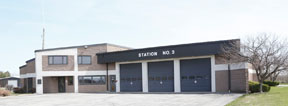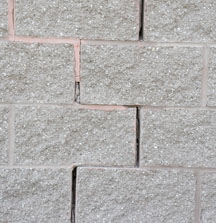Spencerport Fire District plans rehab of Station #3
by Kristina Gabalski
 Spencerport Fire District Station #3 on South Union Street.The need for repairs to the Spencerport Fire District Station #3 on South Union Street in Ogden is clearly evident: large step and pressure cracks in both interior and exterior walls, some so pronounced you can stick your finger into them; bubbling and peeling interior paint; metal roof panels that are rusting and separating, allowing them to be lifted up with one’s hand.
Spencerport Fire District Station #3 on South Union Street.The need for repairs to the Spencerport Fire District Station #3 on South Union Street in Ogden is clearly evident: large step and pressure cracks in both interior and exterior walls, some so pronounced you can stick your finger into them; bubbling and peeling interior paint; metal roof panels that are rusting and separating, allowing them to be lifted up with one’s hand.
The fire district plans to tackle repair and restoration work in the coming months and District Administrator Dave Goddard and Board of Commissioners Chairman Rich McQuilkin say consultants are being selected for the project this month.
The expected cost of the project is approximately $335,000.00. Both men say there are sufficient funds available in the district’s Buildings Reserve Fund to cover that cost.
The fire station will remain open during the renovation/restoration project.
“The firehouse is going to be completely functional throughout the time frame,” Goddard says. “The construction will not affect service.”
Three issues will be addressed: interior and exterior wall problems, the roof and gutters/downspouts.
“We thought it was prudent to do it all at once,” McQuilkin says.
 The outside of the east side of the building shows step cracking, an opening of the joints between the cinder blocks, under a window frame. The remedy is to remove damaged blocks and install an expansion joint.Goddard says a building and masonry assessment prepared for the district determined that the building is sound and functional, but the current deficiencies require repair to extend the service life of the structure which was built nearly 25 years ago.
The outside of the east side of the building shows step cracking, an opening of the joints between the cinder blocks, under a window frame. The remedy is to remove damaged blocks and install an expansion joint.Goddard says a building and masonry assessment prepared for the district determined that the building is sound and functional, but the current deficiencies require repair to extend the service life of the structure which was built nearly 25 years ago.
Moisture is the cause of most of the problems. The split-face masonry block which covers exterior walls is very porous, McQuilkin says, allowing for moisture to seep in.
“It’s the result of the age of the building – the materials have reached their life expectancy,” he says. “The gutters have failed. We need to get water off the roof and away from the building.”
“We have had issues for years with water coming in on the desk in the radio room,” Goddard adds.
The fire district has tried repeatedly over the years to correct the problems, but to no avail, McQuilkin and Goddard say.
Other problems found by the assessment include caulking on the roof that has peeled away, moisture stains on the exterior walls, exterior weep holes that become plugged due to the design – “water backs up and causes all kinds of problems,” Goddard says; and the lack of control joints along the walls which would have allowed for movement over the years and prevented cracking.
“Control joints don’t exist,” both men say.
Inside the apparatus bay, paint is bubbling and chipping along the top of the walls due to moisture getting inside the blocks. Wind has also blown out and shifted insulation.
The existing metal roof deck will be completely covered with a membrane. “It will be like a new roof on top of the old,” Goddard says.
The cost is significantly less expensive than tearing off the current roof and replacing it with an entirely new one, McQuilkin says.
Gutters and downspouts are part of the roof project and exterior and interior wall joints and cracks will be repaired. A water repellant/sealer will be applied to exterior walls – and will be re-applied on a regular basis, McQuilkin says.
Interior walls will be repainted with “breathable paints” that won’t bubble, Goddard says, and he adds a thermal imaging of the building will be completed to see where insulation needs to be replaced.
Window seals and weep holes around windows and doors will be replaced as well.
The project timetable includes selection of an architect and construction management firm this month – the bidding/awarding process will take place from June until early July. Work will begin in July and the project should be complete by October of this year,” Goddard says.



